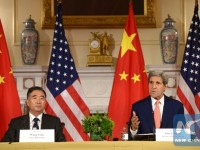Wu Zurong, Research Fellow, China Foundation for Int'l Studies
Sep 09, 2016
A visit to China by Pentagon chief Ashton Carter could help increase mutual understanding, dispel some unnecessary misjudgments, and build more political trust between the two countries and their armed forces. For the sake of improving Sino-U.S. relations, the two sides should have grasped the opportunity rather than beating a retreat in the face of difficulties.
Ben Reynolds, Writer and Foreign Policy Analyst in New York
Jun 30, 2016
Many of the new climate change-related developments within the Strategic and Economic Dialogue emerged from a summit that brought U.S. and Chinese policymakers and private sector leaders together to establish cooperative relationships. Benjamin Reynolds describes some of the interesting and practical agreements on energy and climate change between private and public sectors, but also reminds us that previous climate accords have always struggled to enforce climate targets that are often conveniently forgotten after big summits.
Eric Farnsworth, Vice President, COA, Washington D.C. Office
Jun 28, 2016
The bilateral U.S. – China Strategic and Economic Dialogue has served as a critically important mechanism by which both governments have developed the means to discuss core issues in the economic relationship. As China’s dash for economic growth continues, pressure will be on both the United States and China to ensure these discussions deliver concrete results.
Richard Weitz, Senior Fellow, Hudson Institute
Jun 23, 2016
Escalating tensions regarding the Asian-Pacific territorial disputes and other security issues make clear that we need a new approach to dealing with these regional questions. Recent weeks have seen renewed Chinese-U.S. military incidents, stalemated China-U.S. security talks, and a failed China-ASEAN foreign ministers’ meeting.
Wu Zhenglong, Senior Research Fellow, China Foundation for International Studies
Jun 21, 2016
Over three administrations by both the Democratic and Republican parties, the S&ED has helped China and the US to pursue a new model of major-country relationship, and its effectiveness should be cherished by both sides. After the presidential elections this year, it will be critically important to guarantee a smooth development of China-US relations.
Wu Jianmin, Former President, China Foreign Affairs University
Jun 14, 2016
The presidents of the two nation took stock of the bilateral relationship and concluded that common interests are much more important than differences, thus securing a sound and steady growth of the China-US relationship. For some reason, that reality is not easy for many pundits, politicians and media observers to grasp, resulting in diminished expectations despite evidence to the contrary.

Shen Dingli, Professor, Institute of International Studies, Fudan University
Jun 14, 2016
S&ED is a means to help stabilize and improve partnership. However, when each’s strategic interests differ or even collide, a dialogue will not be able to resolve the problem. The best the dialogue could do is to assure that each side will take sensible decisions, ideally through mutual concession. This is what the S&ED of the Obama era has been about.
Franz-Stefan Gady, Associate Editor, Diplomat
Jun 07, 2016
South China Sea tensions appear to reveal the innate character and intentions of both countries. However, small inkblots, just like small islands, can only explain so much when assessing the overall China-U.S. bilateral relationship. These inkblots imperil a more comprehensive scrutiny of the larger geo-political canvas of the ongoing 8th China-U.S. Strategic and Economic Dialogue.
Jun 07, 2016
China will submit next week its "negative list" offer of sectors that would remain off-limits to U.S. investment in a U.S.-China bilateral investment treaty (BIT), Vice Premier Wang Yang said on Monday.